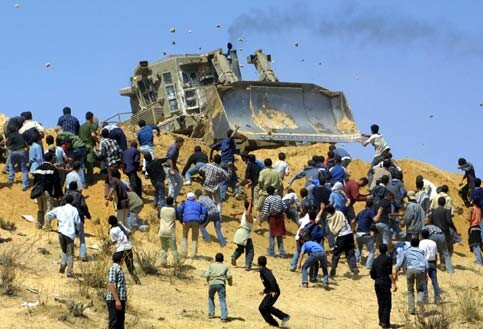The Electronic Intifada 3 June 2006

Palestinian youths throw stones at an Israeli army bulldozer in Beit Lahia in the northern Gaza Strip, 22 April 2004. (AFP Photo/Mohammed Abed)
I’m currently on my first visit to the United States. I find most Americans don’t know much about the lives of Palestinians like me.
My family and I live in Rafah. On January 21, 2004, our neighbor, Abu Jamil, woke us at 2:00 AM. He asked for help because the Israeli military came to bulldoze his home. My mother and I helped his family to empty their house. By 6:00 AM it was demolished.
I took a shower and studied for an exam. I made tea for everyone. I thought they wouldn’t destroy more houses, but soon my grandmother, my aunt, my uncles and cousins appeared, because their homes had just been demolished. We all sat in one room. I thought we were safe although I heard bulldozers outside, but soon our neighbor warned us that they had started destroying our home. Everyone left the house. I helped my grandmother because she has trouble walking. My mother passed out and couldn’t get up, but I dragged her to a safer place.
Then I realized I forgot my bag with all my important papers. I returned home to get it, and just as I left, the house’s last concrete blocks fell right behind me. That day Israeli bulldozers destroyed 50 homes in our neighborhood.
Since then, we have moved seven times. I have two brothers, four sisters and my parents. It’s hard because we are never in our own home.
Since 1967 Israel has demolished 12,000 Palestinian homes. During this uprising, Israel has demolished 2000 homes in Rafah, mostly near the border with Egypt, and 3,000 houses in the Gaza Strip. In Rafah 3,000 people remain homeless.
The Israelis say they destroyed homes in Rafah because they hid tunnels for smuggling weapons. Do 2000 houses in Rafah hide tunnels? Israel’s real reason for flattening entire neighborhoods was to build a wall, twice as high as the Berlin Wall, on the border between Egypt and Palestine.
I once asked a man who lived in an isolated home far from the border why they demolished his house? He said that the bulldozer driver told him, “To make you suffer.”
After my home was demolished, I was inspired by the example of the American activist Rachel Corrie who was killed by an Israeli bulldozer in Rafah, and my friends and I decided to organize to help families near the border. But I wanted to do more. I started working with children, and succeeded by opening Life Makers, a children’s educational center. We started with 40 children and now we have 300.
Many of the children have been traumatized. Some of their homes have been bulldozed, and their family and friends killed. So we try to teach them to play nonviolent games and to act like children.
Most Americans think we are free after Israel’s disengagement from Gaza. But since then more than 50 Gazans have been killed by Israeli missiles. The Israelis left Gaza’s land, but they still occupy the air. Gaza is like a prison, with only one exit, to Egypt.
I am asked most why Palestinians voted for Hamas. The US government sent observers to monitor our elections. They accepted Hamas as a participant. Hamas was democratically chosen and that must be respected. Some of the Palestinian Authority was corrupt. They lost the people’s trust. Hamas’ slogan was ‘Rebuilding and Change’, and for several years they have been working on building social infrastructure and improvements that people see in their daily lives. I believe this was why they won.
Hamas needs to be given a chance first. Instead, the world is punishing us all – no salaries, food, gas, medicine, and no money transferred from outside. I know some families who now eat just one meal a day.
American taxpayers give Israel three billion dollars every year. The money goes for weapons. When I came here I was surprised to see poor, homeless people. Your country needs to care for these people.
I think if ordinary people here knew what was happening to ordinary people in Palestine, they would be more compassionate. We need food, water and homes. We need work and access to the world. We need justice. When Palestinians have justice there will be peace.
Fida Qeshta is a 23 year old educator and activist from Rafah in the Gaza Strip.
Related Links
